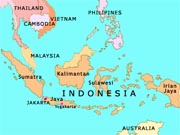Basel hazardous waste conference ends on Indonesia's Bali island
 Bali, Indonesia - Representatives from 170 countries concluded a five-day informal meeting on the Indonesian resort island of Bali on Friday, vowing to fight the illegal trans-boundary movement of hazardous waste and promote the safe and environmentally sound management of waste within each country.
Bali, Indonesia - Representatives from 170 countries concluded a five-day informal meeting on the Indonesian resort island of Bali on Friday, vowing to fight the illegal trans-boundary movement of hazardous waste and promote the safe and environmentally sound management of waste within each country.
A declaration issued at the end of the five-day informal conference agreed to further promote international, regional, and inter-agency cooperation, coordination and planning, while sharing the technology needed to tackle hazardous wastes issues.
"We are fully aware that wastes, if not managed in a safe and environmentally sound manner, may have serious consequences for the environment, human health and sustainable livelihood," the declaration said.
"Therefore we reaffirm our commitment to prevent illegal trans-boundary movement of hazardous wastes, to minimize the generation of, and to promote the safe and environmentally sound management of wastes within each country."
Many of the delegates from the developing world attending the conference wanted the Basel Convention to go further, arguing the only way to end the trade in toxic waste is with an all-out export ban on such materials.
The Basel Convention was adopted in the late 1980s and entered into force in 1992. It requires the export and import of all hazardous waste to be banned to protect human health and the environment against their adverse effects.
However, only 62 member countries have so far ratified the amendment, including Indonesia.
International activist groups, including Greenpeace and the Basel Action Network, have repeatedly called on the Basel parties to enforce the ban amendment immediately to prevent further environmental damage.
The declaration encourages all parties, including international and regional organizations, to promote awareness on the link between waste management, health, livelihoods and environment.
It also calls for the strengthening of regional and sub-regional collaboration in waste and health issues.
It advocates improving waste shipment and border controls to prevent the illegal movement of hazardous wastes and other wastes, through capacity building, technology transfer and technical assistance.
The declaration also calls for improving cooperation between national authorities in the waste, chemicals and health sectors, and in collaboration with other relevant authorities and stakeholders, in the development and implementation of effective and sound waste management systems. (dpa)